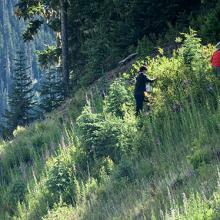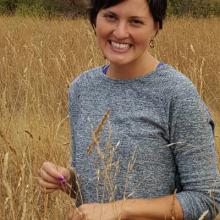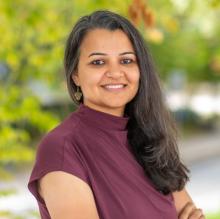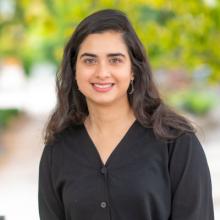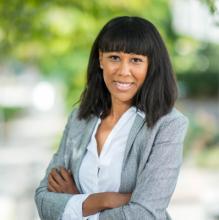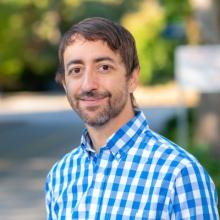Tonya's research with the Líl̓wat Nation asks questions about how forestry and land management interact with Indigenous food security and sovereignty. While assessing new ways to support community food security, together they are exploring how Indigenous teachings and ways of being may enhance/re-place the 'ecosystem services' framework.
Research Description
For the Lil'wat First Nation, food security includes not only the ability to access foods from local stores, but also the ability to access Indigenous foods found throughout Lil'wat (the land). This control over their own food system, known as food sovereignty, relies on the ability of elders to pass along knowledge about harvesting foods to younger generations, including protocols used to cultivate and protect wild foods, and communicate with other forest and land users to increase the visibility and protection of Indigenous foods. This collaborative research will a) define food security and sovereignty for the Lil'wat Nation to communicate impacts on foods to a wider public, b) assess the 'ecosystem services' framework to understand how it supports and/or conflicts with Lil'wat ways of being and relational values, and c) determine new pathways to support community-based food security and sovereignty.
What does being a Public Scholar mean to you?
I feel that it is possible for the university to contribute positively towards community goals in meaningful ways. This involves working with people to define the research questions, and making sure to be checking in with them so that the research continues to provide meaningful information and outputs. I hope to nurture and facilitate the exchange of knowledge and improved relationships between the Lil'wat Nation and the university, and (re)generate knowledge that will help to answer important real-world questions.
In what ways do you think the PhD experience can be re-imagined with the Public Scholars Initiative?
Growing up, I was never interested in doing a PhD, because firstly, I didn't know what it was and secondly, once I found out it what it meant, it seemed very out-of-touch with my reality. But I think that being a PhD means something different now than it did. Public Scholars Initiative is a strong example of a program helping to make PhDs in touch with people, communities, real-world problems and opportunities outside of academic circles.
How do you envision connecting your PhD work with broader career possibilities?
My PhD is teaching me to be able to speak about different sides of ideas to different people. It's kind of like acting as a translator! I hope I will be able to apply these skills in translation and transformation in supporting communities to make the changes that they want in the future. One of my dreams is to be employed with a First Nation in some capacity.
How does your research engage with the larger community and social partners?
I was invited to work with the Lil'wat Nation around four years ago to explore how forestry impacts Indigenous food and medicinal plants. Since then I've been visiting with elders to document and share Indigenous food-related knowledge. This year we will make a book together about how plants are processed and used in Indigenous recipes. On a wider level, we are looking at the relationships between Territory (including people, plants, animals and others) and foods, and what sorts of activities will strengthen food security and sovereignty.
Why did you decide to pursue a graduate degree?
I love (re)searching for answers and finding new questions along the way. My dedication to pursuing a PhD comes from my belief that we can make better land use decisions impacting British Columbia's forests and communities. I believe that these decisions should be rooted in respectful listening and reciprocity with Indigenous peoples, and work to uphold Indigenous rights while also respecting relationships with other beings.
Why did you choose to come to British Columbia and study at UBC?
My decision to study at UBC came not only from the amazing research being done here, but by its embeddedness in the ‘real world’. British Columbia is my home and where I hope to grow old. In the UBC Faculty of Forestry, I am introduced to experts in business, government and communities, and can directly ask them questions. The Faculty of Forestry also maintains a community feel that fosters a sense of belonging.
For you, what was the best surprise about graduate life, about UBC or life in Vancouver?
The best surprise when I started at UBC was that you can wander 15 minutes away from any building and end up in the middle of the forest. The bigger surprise was when we got to visit the forest as a classroom!
What aspect of your graduate program do you enjoy the most or are looking forward to with the greatest curiosity?
Working closely with the Líl̓wat community using Indigenous research methods has been a transformational experience for me. I love being in Líl̓wat Territory with elders and experts, and learning about the depth of their connection with the land and its creatures.
What aspects of your life or career before now have best prepared you for your UBC graduate program?
Being an open listener and learning to hold back judgement has best prepared me for my role as a researcher. Growing up as a listener, not a talker-- now these skills are beginning to show their value.
What do you like to do for fun or relaxation?
I like to play in the garden, be with animals, read the wisdom of others, cook up a storm, hear a good tale, and swim in the sea.
Do you have any tips for students from your home country coming to Canada / to UBC Grad School?
In my experience, the best idea has been saying yes to opportunities as they come, and trying to not worry about the future. Saying yes has brought me to wonderful and unexpected places and people. Also, I have been fortunate to work with a supervisor with whom I have very good communication and who inspires me. This support from my supervisor has been paramount to my experience as a graduate student.
I hope to nurture and facilitate the exchange of knowledge and improved relationships between the Lil'wat Nation and the university, and (re)generate knowledge that will help to answer important real-world questions.

